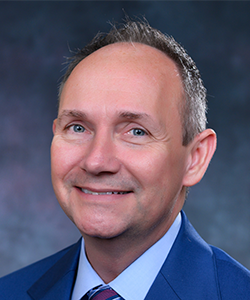Evolving with Change: The Benefits of Expanding Interstate Licensure
 Asked to reflect on his career, Cole Edmonson, DNP, RN, FACHE, NEA-BC, FAAN, FAONL, FNAP, chief clinical officer, AMN Healthcare Services, Inc., says he has been blessed to work alongside incredible people at world-class organizations as a clinical nurse, a nurse leader, a chief nurse, and his current role as chief clinical officer at AMN Healthcare. Edmonson is responsible for ensuring quality across the AMN enterprise and supporting professionals caring for patients and families at thousands of health care organizations in all 50 states.
Asked to reflect on his career, Cole Edmonson, DNP, RN, FACHE, NEA-BC, FAAN, FAONL, FNAP, chief clinical officer, AMN Healthcare Services, Inc., says he has been blessed to work alongside incredible people at world-class organizations as a clinical nurse, a nurse leader, a chief nurse, and his current role as chief clinical officer at AMN Healthcare. Edmonson is responsible for ensuring quality across the AMN enterprise and supporting professionals caring for patients and families at thousands of health care organizations in all 50 states.
Edmonson is a fellow in the American Academy of Nursing and the American College of Healthcare Executives and is Nursing Executive Advanced-Board Certified by the American Nurses Credentialing Center. He is a Robert Wood Johnson Foundation Executive Nurse Fellow Alumni. As a national speaker, he has given presentations on transformational leadership, quality improvement, physician relationship building, and nursing engagement. AMN Healthcare provides workforce solutions and staffing services to health care facilities, and its network of nurses, physicians and allied professionals is the largest in the country.
Edmonson hears stories every day from NLC nurses who are making a difference in the lives of patients. "Most recently, we recognized a travel nurse who received an award from the organization where she was caring for a patient who was not going to recover from a severe neurological injury," recalls Edmonson. "The nurse, based on her experience in other facilities and states, advocated for her young patient to receive an honor walk."
An 
Additionally, he sees and understands the challenges to the nurse, patients, and health care systems faced in terms of access to care, timely licensing and re-licensing, mobility and the increased expense to each stakeholder, including his own organization that works in the complexity of the regulation and employees specific resources to navigate the current complexity. Edmonson believes the compact can reduce complexity, decrease cost and provide an equal or even higher level of protection to the public, while advancing the profession holistically. Edmonson believes that “the compact license is one powerful way to address the maldistribution of licensed nurses in the U.S. that we are experiencing – by making nurse practice more mobile.”
In 2017, Edmonson co-authored 
With 32 states in the compact and two more with pending implementation, Edmonson says it would be positive for nurses, patients, families and health care in general if all states were in the compact.
"As care models continue to transform to include virtual care, so must regulation and law to support increasing access to care, lowering cost of care, and making care more convenient if we are to achieve true health in our country," he says. "Under the current fragmented system, an excellent clinician may be a few miles away (or a video screen away) from a patient who could benefit from her or his services. But that patient can’t receive that help because of licensure limitations. Telehealth is expanding rapidly, and it will have tremendous benefits to patients everywhere, especially in underserved areas such as rural America and even some interurban areas with vulnerable populations. Interstate licensure not only allows clinicians to go wherever they are most needed, but, more importantly, it allows their skills to be utilized by patients wherever they are most needed."
As the compact has evolved, a few states are still hesitant to join. One criticism of the compact is related to the safety of patients, and is due to a misunderstanding about the licensure standards to be an NLC member state. On this subject, Edmonson says, “Every patient in every state deserves the same quality, standards, and safety of patient care, and there’s really no reason why health care professionals themselves should be held to different standards,” he says. “There should be only one standard of care, and that’s quality care. Compact licensure promulgates a level of quality and safety standards that protect and serve patients equally in all states. I can understand that heightened standards may create some initial discomfort, but they can quickly become the norm when we focus on the patient.”
